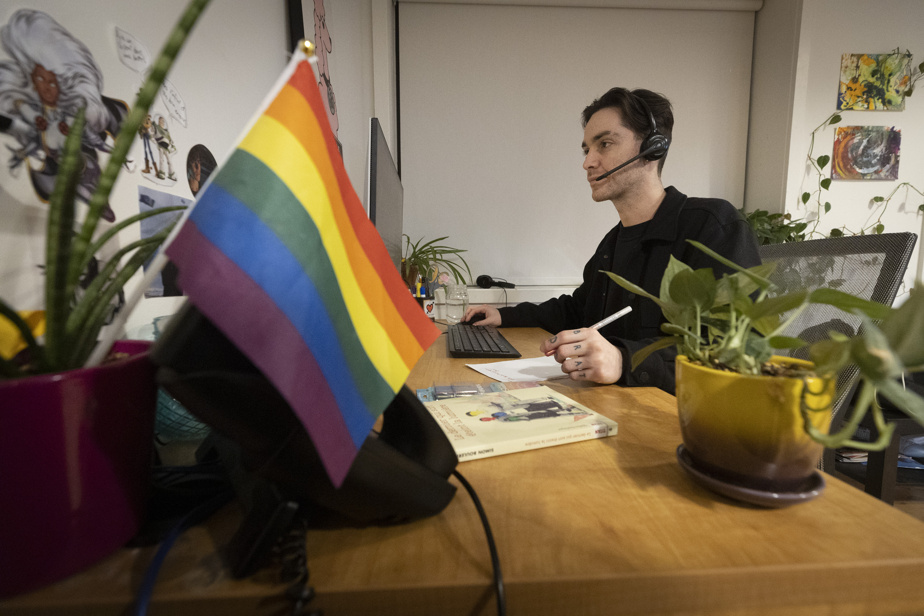1:13 a.m., in the middle of a night in March. The telephone rings at the Interligne premises, in the east of Plateau-Mont-Royal. At the end of the line, a man in tears. Her life has just been turned upside down due to an episode of domestic violence on the part of her spouse.
“Are you safe right now, both at home and in your head?” asks Olivier, the worker on duty.
In the imposing silence of the night, Olivier nods, headset on his ears. At regular intervals, in a soft voice, he replies to his interlocutor:
“The fact that you called tonight says a lot about your strength. »
“I hear your crying. »
“It’s important to use your voice to denounce. »
This man hangs up about twenty minutes later, calmed down. And he takes the trouble to call back in the night, to give news and say that he feels better.
If this man had called a few weeks later, he might have been silenced. The Interligne night service is expected to close at the end of the month due to lack of funding, announced its general manager, Pascal Vaillancourt.
The organization has launched a fundraiser to try to save its service. But “even if we get there, the problem is the recurrence [of funding], explained Mr. Vaillancourt in an interview. We do not have the means to go on a fundraising or media campaign every year. »
Existential crises, isolation, homophobia and transphobia, physical and psychological abuse, substance abuse, mental health or psychiatric issues, suicide prevention: people who call at night often do so because “the straw broke the camel’s back”, notes Olivier, an employee of the organization for two years.
For him, it is obvious that the distress is more acute in the dark. “There are young people for whom it is often the only time, in their room, to open up anonymously, he illustrates. Parents too. I’ve also had big suicidal calls that last for over an hour. »
In total, 22,750 contacts were established in 2021-2022 with the Interligne helpline, whether by telephone or chat, according to the organization’s latest annual report. Two out of ten calls directly affect mental health.
However, Interligne’s annual budget is well below that of other hotlines, denounces Mr. Vaillancourt.
Funding for the organization is $362,534 for 2022-2023, the Ministry of Health and Social Services (MSSS) confirmed to La Presse. Mr. Vaillancourt estimates that he needs twice as much to be able to function.
“Services for the general population can revive homophobia or transphobia in an LGBTQ person,” explained Marie-Claude Gendron, director of communications for the organization, whom we met on site.
Interligne responders are therefore trained to handle all distress calls, including suicidal crises.
According to a 2017 Canada-wide survey by the Jasmin Roy Foundation, 13% of the Canadian population is LGBTQ.
The MSSS told La Presse that it recognizes “the importance of community organizations and their crucial role for the population.” In the process, he specified that the Info-Social 811 line and the Quebec suicide prevention line are there to meet the needs of Quebecers.
But calls to Interligne are precisely transferred by… Info-Social, notes Ms. Gendron.
Another consequence of the organization’s chronic underfunding: meager salaries, even compared to other community organizations.
The service has about twenty workers and between 60 and 80 volunteers.
Despite a recent improvement, the entry wage at Interligne is $17 an hour, barely more than the minimum wage, which will be $15.25 an hour as of May 23, deplores Mr. Vaillancourt. . And this, even if the speakers have higher education diplomas.
An unacceptable situation, according to Ms. Gendron. “It’s not normal to work full time and wonder if you’re going to be able to pay your rent. »

